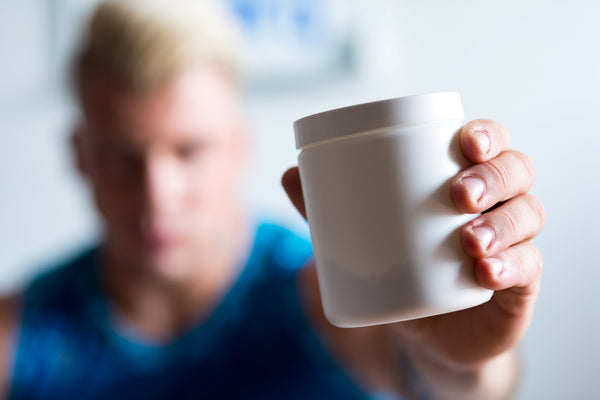In this article, we examine the benefits of the common pre-workout supplement beta-alanine for performance in high-intensity exercise.
Key Points
- Beta-alanine is an amino acid found in animal products and produced naturally by the body.
- It elevates carnosine levels in the muscles, which helps to delay the onset of fatigue in high intensity exercise 1-10 minutes in duration.
- There are potential benefits for resistance training and body composition, but more research is needed.
- It is considered a safe and well-studied supplement but may cause a harmless tingling sensation in some individuals. This can be prevented or minimized by taking multiple smaller doses or using a sustained release formulation.
- The optimal dosage of beta-alanine is between 3.2–6.4 grams per day for at least 4 weeks.
What is Beta-Alanine?

Beta-alanine is a non-essential amino acid, meaning the body can produce it on its own, rather than consuming it as part of the diet. Unlike most amino acids, beta-alanine is not used to synthesize proteins. Instead, it is a precursor of a molecule called carnosine.
Research has found that supplementing with beta-alanine can increase the production of carnosine, which buffers hydrogen ions produced during high-intensity exercise and plays a role in reducing the buildup of lactic acid in the muscles during exercise.
The drop in muscle pH and lactic acid buildup can lead to muscle dysfunction and fatigue, so increasing carnosine can help delay the onset of fatigue, allowing individuals to perform high-intensity activities for longer (1).
How Does Beta-Alanine Improve Performance?
To understand the effects of beta-alanine on performance, it is helpful to differentiate between the two ways the body produces energy: aerobic and anaerobic metabolism.
The choice between these pathways for energy production depends on whether oxygen is available, which is determined by the intensity and duration of exercise (2).
-
Aerobic metabolism: Used for low to moderate-intensity activities that require prolonged energy, for example, jogging and cycling at a consistent pace for a period of time. It uses oxygen along with glucose, fatty acids, and amino acids to produce energy and creates carbon dioxide and water as byproducts (2).
- Anaerobic metabolism: Used for short bursts of high-intensity exercise, where there is not enough oxygen to meet the body’s energy needs. This includes any kind of explosive exercise, such as sprinting or weightlifting. When energy is produced this way, glucose is not broken down completely, and lactic acid is produced as a byproduct (2).
Beta-alanine supplementation can provide a competitive edge during high intensity exercise lasting 1-10 minutes in duration (3).
When lactic acid is produced during anaerobic metabolism, it increases the acidity of the muscles. As the muscles become more acidic, this interferes with their normal functioning, and they become unable to contract properly, leading to fatigue (4).
When carnosine is present, it acts as a buffer, reducing the acidity and delaying fatigue. Therefore, having higher concentrations of carnosine in the muscles can benefit athletic performance (4). Supplementing with carnosine directly is ineffective because it is broken down by the body before it reaches the muscles (1).
However, when supplementing with beta-alanine, it combines with another plentiful amino acid, histidine, to produce carnosine, and can increase the carnosine concentration in the muscles by up to 80% after 10 weeks of supplementation (5).
In addition to its buffering effects, another way that carnosine may impact exercise performance is by acting as an antioxidant. Reactive oxygen species (ROS) are molecules that are produced at a higher rate during exercise and may lead to fatigue and muscle damage. Carnosine has been shown to interact and neutralize ROS, preventing them from causing cell damage.
Carnosine also has the ability to bind with metal ions like copper and iron and prevent them from participating in chemical reactions that produce ROS. However, these are just two proposed mechanisms, and more research is needed in this area to fully understand the antioxidant properties of carnosine (1).
Benefits of Beta-Alanine

Beta-alanine supplementation has been found to have beneficial effects on performance across a variety of sports that require short bursts of intense effort (1). The most significant effects are seen between one and four minutes, but the benefits may continue up to 10 minutes of high-intensity bouts of exercise (3).
One significant finding is that supplementation increases time-to-exhaustion, meaning test subjects are able to exercise for a longer period of time before their muscles fatigue (1). For example, in a study on male cyclists that measured their performance to the point of exhaustion, those that received four weeks of beta-alanine supplementation increased their total work done by 13% (5).
In another study on two groups of elite rowers, those that received seven weeks of beta-alanine supplementation (5 grams/day) completed time trials 4.3 seconds faster than the group that had not received the supplement, when before the supplement they were 0.3 seconds slower (6).
Effects have also been found in non-athletes. Stout and colleagues found that 3.2 grams/day of supplementation with beta-alanine for 28 days increased physical work capacity and time to exhaustion in untrained males (7).
When looking at research on resistance training, the impact of beta-alanine has been mixed. Some studies have found that beta-alanine supplementation increases training volume and muscular endurance. Other resistance training studies have found no difference between the beta-alanine and placebo groups (1).
When it comes to body composition, the combination of beta-alanine with creatine may be beneficial. While some studies have found that beta-alanine alone has no significant effect on body composition, one study found that combining beta-alanine with creatine produced greater changes in muscle mass and body fat percentage than either of these supplements separately (1, 8).
Drawbacks of Beta-Alanine
Beta-alanine is generally considered a safe supplement. The most common side effect is a tingling or itching sensation in the skin of the face, neck, and hands, called paresthesia (1). While this sensation is not harmful, some people find it irritating.
If you find the tingling uncomfortable but still want to experience the benefits of beta-alanine, try taking multiple smaller doses throughout the day. Beta-alanine does not need to be taken around exercise to reap its muscle benefits. Interestingly, a beta-alanine supplement with a sustained-release formulation is also a viable option as research has shown it typically removes this tingling effect (1, 9).
Proper Dosage of Beta Alanine
Studies on beta-alanine have used a variety of dosages, with 3.2–6.4 grams per day over a period of 4-24 weeks having been shown to improve exercise performance (10).
Although beta-alanine is typically included in pre-workout supplements, taking it immediately before a workout is not necessary to see an effect. The most important factor is taking it over a period of time of at least 4 weeks, to allow sufficient time for carnosine levels in the muscles to increase (1).
From whole foods, beta-alanine is only found in animal products, with top sources being beef, pork, poultry, and fish. However, reaching the recommended dose for improved exercise performance would be difficult using food alone, so supplementation is typically required (11).
Beta-Alanine: The Bottom Line

Taking beta-alanine as a supplement has been shown to improve performance in short and intense exercises, allowing individuals to push themselves harder and longer.
This can be beneficial in both training and competitive performance. Beta-alanine may also help to increase training volume and muscular endurance during resistance training, and when combined with creatine, may improve body composition. Overall, incorporating beta-alanine into a fitness regimen, with a recommended dosage of at least 3.2 grams per day over a period of more than 4 weeks, can enhance exercise performance across various sports.
However, it is important to keep in mind that supplements are not a replacement for a balanced diet, a well-structured training program, and adequate rest and recovery when it comes to seeing results from your workouts. Once you have built strong nutrition and training habits, an easy way to incorporate regular use is to include beta-alanine in a pre workout formula. Shifted Pre Workouts contain a safe and effective 3.2-gram dose of beta-alanine.
About the Author
Andres Ayesta is a sports dietitian and the founder of Planos Nutrition, with over 12 years of experience helping people transform their nutrition and lifestyle. He works with busy professionals and parents to help them lose weight, improve their confidence, and show up as the best version of themselves, using a personalized, evidence-based nutrition blueprint.
With a bachelor's degree in Nutrition and Dietetics from the University of Southern Indiana and a master's degree in Exercise Science and Sports Nutrition from the University of Central Florida, Andres has earned numerous certifications, including Certified Strength and Conditioning Coach (CSCS) and Certified Specialist in Sports Dietetics (CSSD). He is a licensed Registered Dietitian in the state of Florida and provides coaching programs worldwide. To connect with Andres, you can find him on TikTok @andresthedietitian or Instagram @andresayesta
References:
-
Trexler ET, Smith-Ryan AE, Stout JR, Hoffman JR, Wilborn CD, Sale C, Kreider RB, Jäger R, Earnest CP, Bannock L, Campbell B. International society of sports nutrition position stand: Beta-Alanine. J Int Soc Sports Nutr. 2022 Apr 1. https://www.ncbi.nlm.nih.gov/pmc/articles/PMC4501114/#CR22
-
Scott C. Misconceptions about aerobic and anaerobic energy expenditure. J Int Soc Sports Nutr. 2005 Dec 1;2(2):32. https://www.ncbi.nlm.nih.gov/pmc/articles/PMC2129144/
-
Saunders B, Elliott-Sale K, Artioli GG, Swinton PA, Dolan E, Roschel H, Sale C, Gualano B. β-alanine supplementation to improve exercise capacity and performance: a systematic review and meta-analysis. Br J Sports Med. 2017 Apr 1;51(8):658-69. https://bjsm.bmj.com/content/51/8/658.long
-
Hobson RM, Saunders B, Ball G, Harris RC, Sale C. Effects of β-alanine supplementation on exercise performance: a meta-analysis. J Amino Acids. 2012 Jul;43:25-37. https://www.ncbi.nlm.nih.gov/pmc/articles/PMC3374095/
-
Hill CA, Harris RC, Kim HJ, Harris BD, Sale C, Boobis LH, Kim CK, Wise JA. Influence of β-alanine supplementation on skeletal muscle carnosine concentrations and high intensity cycling capacity. J Amino Acids. 2007 Feb;32(2):225-33. https://link.springer.com/article/10.1007/s00726-006-0364-4
-
Baguet A, Bourgois J, Vanhee L, Achten E, Derave W. Important role of muscle carnosine in rowing performance. J Appl Physiol. 2010 Oct;109(4):1096-101. https://pubmed.ncbi.nlm.nih.gov/20671038/
-
Stout JR, Cramer JT, Mielke M, O'Kroy JO, Torok DJ, Zoeller RF. Effects of twenty-eight days of beta-alanine and creatine monohydrate supplementation on the physical working capacity at neuromuscular fatigue threshold. J Strength Cond Res. 2006 Nov 1;20(4):928-31. https://pubmed.ncbi.nlm.nih.gov/17194255/
-
Hoffman J, Ratamess N, Kang J, Mangine G, Faigenbaum A, Stout J. Effect of creatine and ß-alanine supplementation on performance and endocrine responses in strength/power athletes. Int J Sport Nutr Exerc Metab. 2006 Aug 1;16(4):430-46. https://pubmed.ncbi.nlm.nih.gov/17136944/
-
Varanoske AN, Hoffman JR, Church DD, Coker NA, Baker KM, Dodd SJ, Harris RC, Oliveira LP, Dawson VL, Wang R, Fukuda DH. Comparison of sustained-release and rapid-release β-alanine formulations on changes in skeletal muscle carnosine and histidine content and isometric performance following a muscle-damaging protocol. J Amino Acids. 2019 Jan 28;51:49-60. https://link.springer.com/article/10.1007/s00726-018-2609-4
-
Perim P, Marticorena FM, Ribeiro F, Barreto G, Gobbi N, Kerksick C, Dolan E, Saunders B. Can the skeletal muscle carnosine response to beta-alanine supplementation be optimized?. Front Nutr. 2019 Aug 27;6:135. https://www.ncbi.nlm.nih.gov/pmc/articles/PMC6718727/
- Holmer, B. Beta-Alanine [Internet]. Examine; 2023 [updated 2023 Sept 20; cited 2024 Feb 24]. Available from: https://examine.com/supplements/beta-alanine/faq/what-are-the-main-food-sources-of-beta-alaninecarnosine/
Spread the word:

















